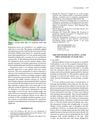 31 citations,
July 2017 in “Journal of the American Academy of Dermatology”
31 citations,
July 2017 in “Journal of the American Academy of Dermatology” Apremilast improved symptoms in patients with severe skin conditions.
 30 citations,
December 1999 in “International Journal of Dermatology”
30 citations,
December 1999 in “International Journal of Dermatology” Oral ivermectin effectively cured scabies with minimal side effects, and finasteride promoted hair growth in men with hair loss.
 28 citations,
April 2010 in “British Journal of Dermatology”
28 citations,
April 2010 in “British Journal of Dermatology” Genetic marker rs12558842 strongly linked to male hair loss.
 23 citations,
October 2018 in “Australasian Journal of Dermatology”
23 citations,
October 2018 in “Australasian Journal of Dermatology” The current understanding of frontal fibrosing alopecia involves immune, genetic, hormonal factors, and possibly environmental triggers, but more research is needed for effective treatments.
 19 citations,
March 1997 in “Journal of Cutaneous Pathology”
19 citations,
March 1997 in “Journal of Cutaneous Pathology” Alopecia areata involves specific T-cells, unlike androgenetic alopecia.
 16 citations,
July 2017 in “Rheumatology and Therapy”
16 citations,
July 2017 in “Rheumatology and Therapy” Tofacitinib, a medication for arthritis, showed potential for treating severe hair loss in a small Brazilian case series, but more research is needed.
 16 citations,
January 2013 in “Internal Medicine”
16 citations,
January 2013 in “Internal Medicine” Early hair whitening may indicate a higher risk of heart disease in young and middle-aged men.
 16 citations,
May 2011 in “Dermatologic therapy”
16 citations,
May 2011 in “Dermatologic therapy” Effective treatments for severe alopecia areata are still lacking.
 14 citations,
March 2022 in “Journal of inflammation research”
14 citations,
March 2022 in “Journal of inflammation research” Baricitinib shows promise as a new treatment for certain skin conditions like alopecia areata.
 14 citations,
February 2021 in “Journal of the European Academy of Dermatology and Venereology”
14 citations,
February 2021 in “Journal of the European Academy of Dermatology and Venereology” A COVID-19 patient with severe hair loss did not improve with hair loss medication after stopping and restarting it due to the infection.
 12 citations,
February 2010 in “Journal of The American Academy of Dermatology”
12 citations,
February 2010 in “Journal of The American Academy of Dermatology” A cancer drug caused unusual hair growth on a 100-year-old man's scalp and eyelashes.
 10 citations,
September 2014 in “The Journal of Steroid Biochemistry and Molecular Biology”
10 citations,
September 2014 in “The Journal of Steroid Biochemistry and Molecular Biology” Allopregnanolone increases KCC2 expression in baby male rats' brains, while finasteride doesn't affect it.
 10 citations,
March 2014 in “Scandinavian journal of clinical and laboratory investigation”
10 citations,
March 2014 in “Scandinavian journal of clinical and laboratory investigation” Malondialdehyde-modified DNA may trigger an immune response in alopecia areata patients.
 8 citations,
July 2018 in “Current Sexual Health Reports”
8 citations,
July 2018 in “Current Sexual Health Reports” Finasteride can cause lasting sexual dysfunction, depression, and other side effects, needing more research for treatment.
 8 citations,
January 2008 in “Pediatric dermatology”
8 citations,
January 2008 in “Pediatric dermatology” Hair gels may cause split ends in children.
 8 citations,
September 2002 in “Genes to Cells”
8 citations,
September 2002 in “Genes to Cells” Killing specific cells in hair follicles can lead to hair growth problems in mice.
 6 citations,
January 2017 in “British Journal of Dermatology”
6 citations,
January 2017 in “British Journal of Dermatology” Frontal fibrosing alopecia is a scarring hair loss condition mainly affecting older women, with no known cause and treatments that may help stabilize hair loss.
 6 citations,
July 2009 in “Veterinary dermatology”
6 citations,
July 2009 in “Veterinary dermatology” Vesiculobullous lesions should be considered part of canine cutaneous epitheliotropic T-cell lymphoma.
 5 citations,
September 2020 in “Journal of Cosmetic Dermatology”
5 citations,
September 2020 in “Journal of Cosmetic Dermatology” Dexpanthenol improves hair growth and satisfaction in women without side effects.
 5 citations,
November 2016 in “Experimental and Therapeutic Medicine”
5 citations,
November 2016 in “Experimental and Therapeutic Medicine” BeauTop improves hair growth in androgenetic alopecia patients.
 4 citations,
May 2021 in “Biomedicines”
4 citations,
May 2021 in “Biomedicines” Targeting the protein Caveolin-1 might help treat a type of scarring hair loss called Frontal Fibrosing Alopecia.
 4 citations,
January 2018 in “General Physiology and Biophysics”
4 citations,
January 2018 in “General Physiology and Biophysics” The steroids allopregnanolone and allotetrahydrodeoxycorticosteron worsened absence seizures in rats.
 3 citations,
August 2020 in “Case Reports in Dermatology”
3 citations,
August 2020 in “Case Reports in Dermatology” Tofacitinib treatment significantly improved a patient's psoriasis, psoriatic arthritis, and alopecia universalis.
 2 citations,
April 2023 in “Curēus”
2 citations,
April 2023 in “Curēus” Valproic acid can cause muscle damage and liver issues, which improve after stopping the drug.
 2 citations,
April 2022 in “Clinical, cosmetic and investigational dermatology”
2 citations,
April 2022 in “Clinical, cosmetic and investigational dermatology” A new plant-based treatment was effective for hair regrowth in women with a specific type of hair loss that didn't respond to usual treatments.
 2 citations,
May 2019 in “Advances in wound care”
2 citations,
May 2019 in “Advances in wound care” Blood-derived CD34+ cells speed up healing, reduce scarring, and regrow hair in skin wounds.
 2 citations,
April 2019 in “Dermatologic Therapy”
2 citations,
April 2019 in “Dermatologic Therapy” A patient with alopecia had hair regrowth with tofacitinib but developed a skin reaction, choosing to continue the treatment despite the side effect.

Topical valproate can effectively promote hair growth.
 2 citations,
January 2010 in “International Journal of Trichology”
2 citations,
January 2010 in “International Journal of Trichology” The Hair India 2010 conference introduced a new hair loss classification and highlighted advanced diagnostic techniques in trichology.
 1 citations,
January 2024 in “Curēus”
1 citations,
January 2024 in “Curēus” Upadacitinib significantly improved a man's severe scalp condition when other treatments failed.






























